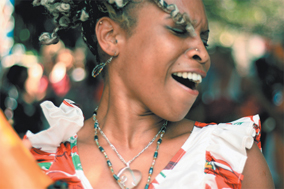Cohen impressed by spirit, passion of Cubans
- Submitted by: admin
- Travel and Tourism
- 06 / 03 / 2010

Clintonville native Hanna Berkeley Cohen had so many memorable experiences during her three months in Cuba this year that she almost forgot to mention the most remarkable of coincidences: spotting a boy in Havana wearing a Clintonville youth baseball league shirt.
By that time, Cohen said, she'd almost gotten used to the array of clothing that somehow finds its way to Cuba.
Cohen, the 19-year-old daughter of Bill and Randi Cohen, recently completed her second year at the University of Pittsburgh, where she has a dual major of philosophy and political science, with a minor in economics.
"They actually intertwine pretty well," she said.
Her goal once she earns her degree is to enter the field of "micro-financing," which in its simplest form, Cohen said, means investing in the poor.
It involves providing money to villages in Third World nations (specifically the women of those villages "because women pay it back, men don't," Cohen said) with the hope of eventually receiving possibly a 5-percent return on investment.
But it's not the return that matters, Cohen said.
"You're investing in their well-being," she said.
Residents of the United States are not officially permitted to visit Cuba, but the University of Pittsburgh is one of 15 to 20 institutions of higher education in this country that has a student visa relationship with the Cuban nation.
Weary of winter weather in Pittsburgh, which she said is much worse than in Columbus, and wanting to brush up on her Spanish, Cohen was one of nine from Pitt to sign up for the trip.
Although Spanish is the language of Cuba, what the natives spoke wasn't anything like what Cohen was used to hearing.
"At first I would ask people if they were joking with me, 'Because I know you didn't just say something to me in Spanish,' " Cohen said.
Once the language gap was more or less bridged after a time, Cohen said that what she found in and around Havana was a "First World" people living in a "Second World" infrastructure on a "Third World" economy.
"The Cubans are the most creative people on earth," Cohen said.
For instance, what few cars are still on the streets of Havana are the vehicles that were there when the Cuban Revolution took place in 1959. Here, such cars are lovingly cared for antiques, Cohen said. There, they are kept running by ingenuity and possibly spit.
"Honestly, I felt like I was in the 'Twilight Zone' the whole time I was there," Cohen said. "It is First and Second and Third World all over, combined in one place."
Cubans also are among some of the most uninhibited people Cohen has encountered.
"Cubans are passionate about everything," she said. "There's no concept of personal space in Cuba. You see what people would be doing in their homes out in society."
A total of 70 American students were in residence at the University of Havana during her stay, Cohen said, and she was disappointed that most of them remained close to their dorms. The whole point of such a trip, in Cohen's view, is to get outside of one's comfort zone.
"Cuba is the most chaotic place I've ever been," she said.
Mom Randi Cohen, a local mental health counselor, is proud of her daughter's adventurous spirit.
"She is amazing," Randi Cohen said. "She is adventuresome and curious about life and really willing to stretch and grow."
In spite of what might be viewed by Americans as a dreary existence of grinding poverty amid crumbling buildings, Hanna Cohen said the Cubans she encountered seem to be enjoying life.
"Everywhere you went there was rum and people having a good time," she said.
"You can definitely be happy in Cuba," Cohen added.
What was once a large and thriving Jewish population in Cuba has, since the revolution, dwindled to only about 1,200 people, 1,000 of them living in Havana.
Cohen said that she will soon be meeting with the JDC official in Miami with an eye toward returning to Havana on a fellowship from the organization.
If she does get that opportunity, Cohen said that she might try to find out how that Clintonville youth baseball league shirt and the other, rather outlandish samples of American duds — Ed Hardy shirts on their backs and Chuck Taylors on their feet — wound up clothing so many Cubans.
"It's one of those mysteries," Cohen said. "Being a tourist, I still don't know the mysteries of Cuba."
By KEVIN PARKS
Source: www.thisweeknews.com
Comments